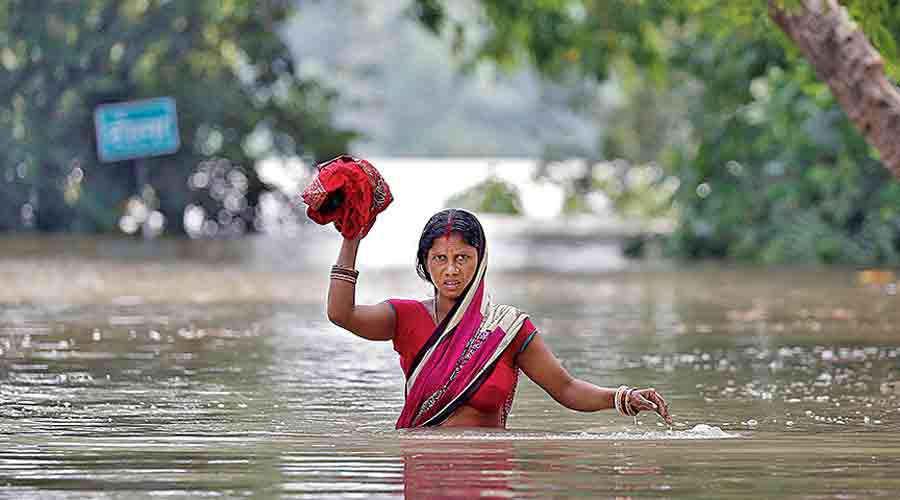Invisible links
Sir — After devastating floods struck Bihar in August 2017, the prime minister, Narendra Modi, conducted an aerial survey of the affected areas. The state’s chief minister often undertakes such surveys. What remains unseen to both of them though is the increased violence and insecurity unleashed upon girls and women of the region in the wake of the disaster. Survey shows that floods make women more vulnerable to violence and trafficking. These invisible links between the environmental effects of climate change — it causes frequent floods — and human lives need to be explored in order to bring about real change.
Kaveri Raj,
Ernakulam, Kerala
Viewers’ choice
Sir — The Advertising Standards Council of India recently conducted a survey to find out what Indian consumers dislike when it comes to product endorsements. The results were both disturbing — a woman going to the theatre with her partner but sharing an ice cream with a stranger sitting next to her was apparently morally outrageous — and interesting. However, one aspect that has come to light is the objectification of men in ads.
Much has been said and written about the objectification of women. But similar treatment of men is seldom condemned — an ad whose punchline was two women wishing there was an app to sell husbands rightly drew condemnation from several quarters. The normalization of such reverse sexism is not right and it will only make gender parity more difficult to achieve. The ASCI should work on the results of its survey and ensure that ads meet the standards set by it.
Amitabha Chakraborty,
Calcutta
Sir — The ASCI survey reveals how easy it has become to outrage people’s sensibilities. Indians seem to be upset about almost anything that is shown in ads and the reasons for their objections are worrying. For instance, one complaint said, “Usage of the phrase ‘upar wala’ to refer to god in an ICICI business banking ad is the promotion of Islam because there is No upar wala in sanantan dharm. god is everywhere...” Ads that show amity between religions or people celebrating festivals of other faiths do not seem to have gone down well either. This is a reflection of the divisions in our society.
Parag Agrawal,
Delhi
Sir — One hopes that the findings of the ASCI survey do not discourage ad film-makers from creating content that reflects religious amity in India. This would be unfortunate. Such ads portray a time when there was brotherhood among people. New India could do with such reminders. Further, the ASCI should not use the complaints it receives as a tool for censorship.
S.S. Paul,
Nadia
Right move
Sir — Novak Djokovic has long been a polarizing figure in tennis. In spite of his athleticism and endurance, he has sometimes been accused of gamesmanship and exaggerating injuries to allow for medical pauses when an opponent has the momentum. He has also exhibited unruly behaviour on court, with occasional racket smashes and a disqualification from the 2020 US Open after recklessly — albeit accidentally — smashing a ball into a line judge.
Given that Djokovic has been less prone to injury than Roger Federer or Rafael Nadal and is younger than them, he is likely to retire with the most men’s Grand Slam titles. If so, he can rightfully be feted as the greatest male tennis star of all time. But how he will be remembered is a more complicated question. Djokovic often attracts eye-rolling outside the court — not simply in relation to his views on vaccines, but also the wider pseudo-scientific ruminations that underpin his public pronouncements. The events of the past week will only make his legacy a more chequered one.
Indranil Sanyal,
Calcutta
Sir — The hashtag, #DjokovicOut, has been trending in Australia. A poll conducted by a local media organization reported a staggering 83 per cent of 60,000 respondents were in favour of Novak Djokovic’s visa being revoked. There is thus much cheer in Australia right now. Djokovic should not have been allowed into the country in the first place, especially at a time when the Omicron variant of the virus is wreaking havoc everywhere.
A.S. Mehta,
Calcutta
Selfish leader
Sir — Boris Johnson has finally found himself in the dock of public opinion, and the jury is turning against him because he has belittled the sacrifices made by his countrymen in the past two years. A search for his basic decency and compassion has discovered a man devoid of empathy, a leader who believes he was exempt from responsibility. He could do what he liked with who he liked — attend a party to enjoy the “lovely weather” — while others outside his charmed circle faced fines for meeting more than one friend outdoors. It is time he resigned before people take that decision out of his hands.
Joy Lahiri,
London, UK
Too harsh
Sir — Malnourishment is rising in Afghanistan. Although there is no shortage of food as such, people lack the money to buy it. Since the Taliban seized control of the country, prices have skyrocketed. The Afghan government had been heavily dependent on foreign aid that was largely cut off when the Taliban took power. The Taliban remain on the sanctions list of the United States of America, so the international community has refused to give Afghanistan money.
Targeted financial sanctions are an appropriate and powerful tool to punish bad actors and odious regimes. The mere threat of them can achieve results. But too often their cumulative effect over time is indistinguishable from collective punishment.
A.K. Sen,
Calcutta
Sir — The situation in Afghanistan is pitiful. The US should consider removing sanctions against the Taliban for the same reason it claimed to attack the country decades ago: the greater good.
Rima Roy,
Calcutta











